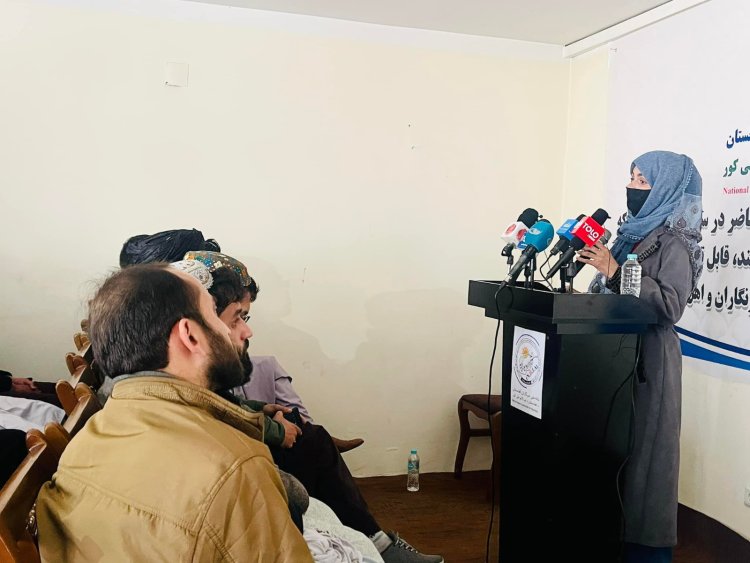From Censorship to Torture: Taliban Intensify Repression in Afghanistan

Since the Taliban's return to power in August 2021, Afghanistan’s civic, cultural, and media spaces have been severely restricted. By enforcing harsh policies, the Taliban have cracked down on freedom of expression and significantly hindered the operations of media outlets and civil society organizations.
In May 2025, Amnesty International reported that over the past year, the Taliban arbitrarily arrested, tortured, and even executed a large number of former government employees, human rights defenders, journalists, and critics. The organization emphasized that the Taliban continue to suppress press freedom and have sentenced hundreds of detainees to death.
Unprecedented Restrictions on Media in Afghanistan
In 2025, the Taliban intensified their crackdown on Afghanistan’s media environment through sweeping and repressive measures. The Afghanistan Journalists Center reported that at least seven radio stations were shut down over the past year either by direct order of the Taliban or due to restrictive policies.
In early February, Taliban forces raided Radio Begum—a women-run station offering educational programming—confiscated its equipment, and shutting it down. Taliban intelligence accused the station of collaborating with foreign networks.
In the same month, the Taliban’s Ministry of Information and Culture in Kabul issued a directive banning the broadcast of political and economic discussions on local television. Media watchdogs strongly condemned this move as an attempt to impose full censorship on independent media.
In March 2025, the broadcasting of women’s voices was completely banned in Kandahar media outlets. Additionally, media institutions were forced to use official Taliban titles when referring to the group’s leadership. Outlets were required to refer to the regime as the “Islamic Emirate” and to the Taliban leader as “Amir al-Mu’minin.”
By June 2025, the Taliban extended the ban on broadcasting live images to Panjshir province. Previously enforced in 18 provinces, this rule prohibits media from showing images of people or animals, threatening punishment for violations.
Arbitrary Arrests of Civil and Media Activists
Throughout this year, the Taliban have arbitrarily detained dozens of educational, cultural, and media activists.
On February 24, Wazir Khan, founder of the education NGO Today’s Child, was arrested in Kabul and transferred to Taliban intelligence. He had travelled to remote areas to promote education, with a focus on girls’ learning.
On February 11, Shafiullah Attaei, a social activist, was arrested by the Taliban and taken to an undisclosed location. Reports say he had previously been arrested and imprisoned for six months by the Taliban two years ago.
Seyed Alam Hashemi, a poet and cultural activist from Panjshir, was also arrested in February by Taliban intelligence in Kabul. His likely “offense” was composing poems honouring Ahmad Shah Massoud and the Panjshir Valley.
That same month, Enayatullah Betash, an Uzbek civil activist in Kunduz, was beaten and arrested in front of his family. He was reportedly released a week later after enduring torture in Taliban custody.
In March, Abdul Wasih Almas, a teacher and former YouTuber, was arrested and disappeared in Panjshir. He had hosted literary and cultural programs on a local media outlet.
Also in March, Taliban forces arrested two prominent LGBTQ activists—Maryam Ravish and Mayo Pisco—at Kabul Airport while they attempted to flee the country. They had previously faced serious threats due to their gender identities.
Mahdi Ansari, a journalist, remains imprisoned after being sentenced to 18 months in January 2025 for "propaganda against the Taliban." He was arrested in October 2024 in western Kabul, and Taliban courts prosecuted him based on content from his personal YouTube channel. Before his arrest, Ansari worked with Afghanistan News Agency.
Other journalists—including Ehsan Mahdawi, Mohammad Asif Faizyār, Seyed Rashid Kashifi, and Sulaiman Rahil—have been arrested and tortured by the Taliban. Independent outlets like Neday-e Baloch have been forced to shut down under security pressure.
Hamid Farhadi, a journalist and former official with Afghanistan’s former government, has been in custody since September 2024. He was sentenced to two years in prison for alleged collaboration with the independent daily Etilaat Roz, which now operates in exile.
In December 2024, Taliban forces arrested two young protesters—Najibullah Watanyar and Ezzatullah Rahimi—for participating in street demonstrations calling for an end to violence against women and the genocide of Hazaras. After over 40 days in detention, Rahimi was released, but Watanyar remains imprisoned.
Women’s Protests and Civil Resistance
Despite ongoing threats, suppression, and restrictions, Afghan women continue to protest Taliban policies. The Independent Coalition of Women’s Movements has warned of the severe repression and systematic gender-based discrimination, describing the situation as “gender apartheid.”
The Voice of Afghan Women movement in exile has called on the international community to take serious action to end forced marriages and gender-based violence. The movement has described Taliban policies as “crimes against humanity.”
Human rights organizations and civil society groups have urged the international community to formally recognize the gender apartheid in Afghanistan and to hold the Taliban accountable for widespread human rights violations.
